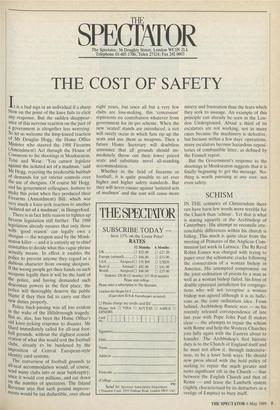SPEC T TATOR
The Spectator, 56 Doughty Street, London WC1N 2LL Telephone 01-405 1706; Telex 27124; Fax 242 0603
THE COST OF SAFETY
It is a bad sign in an individual if a sharp blow on the point of the knee fails to elicit any response. But the sudden disappear- ance of this nervous reaction on the part of a government is altogether less worrying. So let us welcome the limp-kneed reaction of Mr Douglas Hogg, the Home Office Minister who steered the 1988 Firearms (Amendment) Act through the House of Commons to the shootings in Monkseaton, Tyne and Wear. 'You cannot legislate against the isolated act of a madman,' said Mr Hogg, rejecting the predictable hubbub of demands for yet stricter controls over the use of shotguns. Of course Mr Hogg, and his government colleagues, forbore to make this point when they produced their Firearms (Amendment) Bill, which was Very much a knee-jerk reaction to another isolated act of a madman', in Hungerford. . There is in fact little reason to tighten up firearm legislation still further. The 1988 legislation already ensures that only those With 'good reason' can legally own a Shotgun — the weapon used by the Monk- seaton killer — and it is entirely up to chief Constables to decide what this vague phrase actually means. In effect it enables the Police to prevent anyone they regard as a dubious character from owning shotguns. If the wrong people get their hands on such weapons legally then it will be the fault of the police, and having demanded such draconian powers in the first place, the Police will thoroughly deserve the public blame if they then fail to carry out their new duties properly.
. Police buck-passing was all too evident 'Ti the wake of the Hillsborough tragedy. But so, alas, has been the Home Office's old knee-jerking response to disaster. Mr Hurd immediately called for all-seat foot- ball grounds, without the slightest consid- eration of what this would cost the football clubs, already to be burdened by the imposition of Central European-style Identity card systems. The conversion of football grounds to all-seat accommodation would, of course, send many clubs into or near bankruptcy, since it would cost millions, and cut down on the number of spectators. The Inland Revenue says that such ground improve- ments would be tax deductible, over about eight years, but since all but a very few clubs are loss-making, this 'concession' represents no contribution whatever from government for its pet scheme. When the new 'seated' stands are introduced, a riot will surely occur in which fans rip up the seats and use them as weapons. Then a future Home Secretary will doubtless announce that all grounds should im- mediately throw out their lower priced seats and substitute novel all-standing accommodation.
Whether in the field of firearms or football, it is quite possible to set ever higher and higher safety standards. But they will never ensure against 'isolated acts of madmen' and the cost will cause more misery and frustration than the fears which they seek to assuage. An example of this principle can already be seen in the Lon- don Underground. About a third of its escalators are not working, not in many cases because the machinery is defective, but because within a few days' operations, many escalators become hazardous reposi- tories of combustible litter, as defined by the Fennell report.
But the Government's response to the shootings in Monkseaton suggests that it is finally beginning to get the message. No- thing is worth pursuing at any cost, not even safety.


















































 Previous page
Previous page